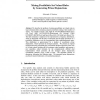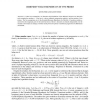39 search results - page 3 / 8 » Evasiveness and the Distribution of Prime Numbers |
MOC
2000
13 years 7 months ago
2000
Seven widely spaced regions of integers with 4,3(x) < 4,1(x) have been discovered using conventional prime sieves. Assuming the generalized Riemann hypothesis, we modify a resul...
AINA
2007
IEEE
2007
IEEE
Reducing the Complexity in the Distributed Multiplication Protocol of Two Polynomially Shared Values
14 years 1 months ago
The multiparty multiplication of two polynomially shared values over Zq with a public prime number q is an important module in distributed computations. The multiplication protoco...
PKDD
1999
Springer
13 years 12 months ago
1999
Springer
We describe the problem of mining possibilistic set-valued rules in large relational tables containing categorical attributes taking a finite number of values. An example of such a...
SIAMDM
2002
13 years 7 months ago
2002
A quorum system is a collection of sets (quorums) every two of which intersect. Quorum systems have been used for many applications in the area of distributed systems, including mu...
EM
2010
13 years 2 months ago
2010
Under two assumptions, we determine the distribution of the difference between two functions each counting the numbers x that are in a given arithmetic progression modulo q and the...


